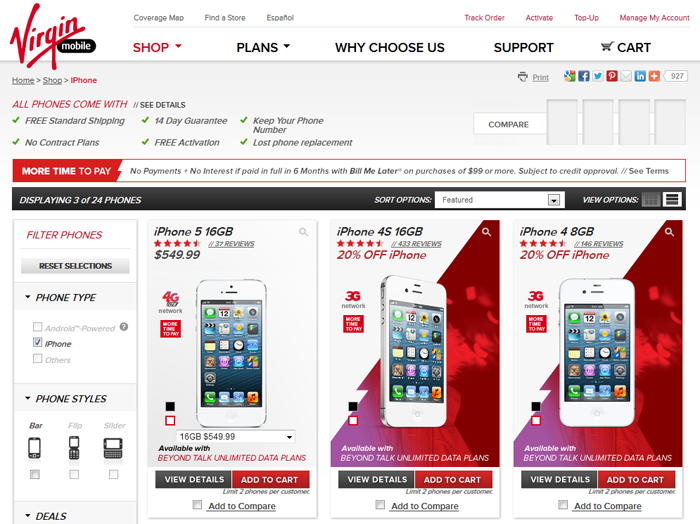
There are two types of carriers here in the U.S.: The kind that locks you into contract and charges you more for you monthly phone bill, and the kind that doesn't lock you into a contract and gives you a cheaper plan every month. Of course you'd think, why would you ever go with the one with the higher phone bill and locks you into a two-year contract? Because the fact of the matter is that by deciding to go with a prepaid carrier, you're going to be shelling out more money for a phone up front than you ever would on a post-paid carrier. When buying a new phone from a pre-paid carrier, you can expect to be paying either full-price, or close to full-price for a phone. That can cost a lot of money.
If you've been keep up with how carriers work since cell phones really became popular, you know that post-paid carriers always offered the best of the best for people who planned to use their cell phones often, and prepaids were around mostly for the casual user who only needed a cell phone in case of emergencies. But times are a-changin', and now pre-paid carriers are, in many ways, better than post-paid carriers are in regards to what plans they offer and how much it costs to pay for them every month. Virgin Mobile charges $55 per month for unlimited everything; Straight Talk only charges $45 for the same plans; even Simple Mobile's plans start at $40 for unlimited usage every month. So really, all we have to deal with now is whether to choose between a cheap phone bill every month or a cheap phone. Despite the cheap plans pre-paid carriers offer us, in order to get a new phone with a prepaid carrier you're still going to need to pay full-price up front for the device.
It would seem like post-paid carriers are giving you a better deal when it comes to purchasing new phones. Not only are they the first to have new flagship devices hit the shelves, but they're selling them at a fraction of the cost that you would pay for them otherwise. A $700 phone suddenly becomes $199, and all I have to do is use it for two years? Heck yeah! Sign me up! Unfortunately, that's not exactly the case. In fact, what carriers are really doing is giving you an extension on how to pay for your phone. You only have to pay $199 today, but remember that pricier monthly plan from post-paid carriers that we talked about? That's because they're including the cost of the phone in with your plan. Essentially, you will end up paying full-price for the phone, plus more - even when you're finished paying for your phone in full, your monthly rates for the rest of your contract won't decrease.
Really, both models work for different people. It would seem like an easy decision to just pay for the phone at its full price and then go for the cheaper monthly plan, but it's easier said than done for a lot of people. For some people, paying the full amount one time and not having to pay a dime more for the device than it's worth is the better option. It's cheaper too, just not immediately. But for others, spreading out the cost of the device into more affordable payments works better for them because not everyone necessarily has $500+ to drop on a device at one time. They might be paying more over time, but sometimes that's just the cost of convenience.
I've been down both roads. I've paid full price for a device and then paid less monthly, but for the most part I'm the person that pays $199 and pays extra every month on my phone bill. I have to admit that I do eventually learn to appreciate the full-price/cheap monthly plan route more in the long run. It hurts the wallet from the get-go, but every month after that is a breeze. $45 for my phone bill is nothing compared to some of the bills I've seen people pay for the same amount of service. But, on the other side of the spectrum, I can say that initially I'm a lot more excited about coming home with a device that only cost me $199 rather than $600. I can't really explain the feeling, but knowing that I'm $400 richer for the time being gives a nice temporary sense of relief.
What about you, readers? Do you prefer to have a cheaper phone up front, or a cheaper monthly bill? Let us know why in the comments below!